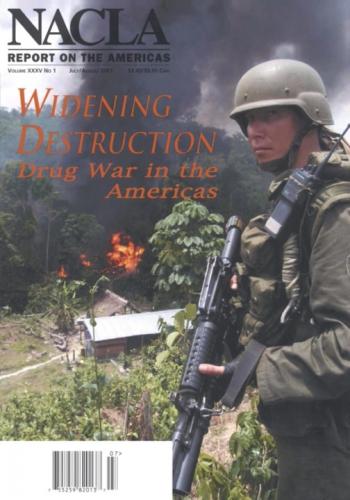Report
Why is the United States in Colombia? Why is it intervening with hundreds of millions of dollars in military aid in a decades-old civil war? The ostensible reason is something called the “war on drugs,” a multi-billion-dollar effort aimed at wiping out a class of illegal substances seen as uniquely threatening to the fabric of U.S. society.
Scientist David Sands calls the microscopic life form a “silver bullet,” a sure-fire weapon that would win the war on drugs. Florida Congressman Bill McCollum used the same words to describe it in 1998, when he proposed that the United States spend $23 million dollars for continued study of mycoherbicides—fungi that kill plants—for use in the drug war.[1]
“Nation building” is what it’s all about, argues Max Manwaring, a professor of military strategy at the U.S. Army War College. “Nobody wants to use it because that term is verboten,” he told the New York Times a few months ago, but it is the driving force behind the growing U.S. role in Colombia’s civil conflict.[1]
Colombia boasts a dizzying array of landscapes: from high Andean páramos to the tropical Amazon, from arid deserts to the rainiest forests in the world in the lowlands along the Pacific Ocean.
If Plan Colombia is an anaconda trying to wrap its coils around Latin America, Ecuador is already in its grip: The United States has turned Manta Air Force Base on the Pacific Coast into a key link in its region-wide air surveillance system.
It is regarded as axiomatic in certain circles that the purpose of U.S. foreign policy is to bolster the interests of U.S. business.
For the third consecutive year, the State Department has deemed that Haiti is failing to fully cooperate with the United States on anti-drug efforts. According to its International Narcotics Control Strategy report published in March, the Caribbean country remains a major transhipment point for Colombian cocaine en route to the United States.[1]
Despite the growing public feeling that the drug war has failed, Attorney General John Ashcroft has declared that he wants to escalate it.[1] “I want to renew it,” he told CNN’s Larry King. “I want to refresh it, relaunch it if you will.”[2]
Ben Kohl & Linda Farthing
For the first time in nearly half a century, Bolivia has been dropped from the list of major drug-producing countries. The country has been hailed by U.S. officials as the only South American country that has successfully eradicated coca production.
Erna von der Walde and Carmen Burbano
1946:
Violence erupts in the countryside between followers of a Conservative Party oligarchy seeking to reclaim ancestral lands and followers of the reformist Liberal Party, seeking to defend its land reforms of the previous two decades.
Some say he got away with everything. Others say he was nailed to the wall. That could be the corrido of Carlos Hank Rhon—the ballad of the rich man’s son.

